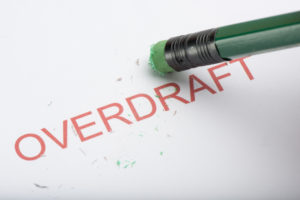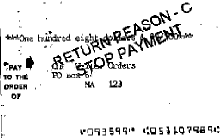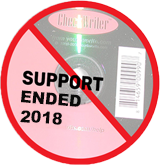Reasons for Return? Why was this check returned?
- Why was my check returned?
- Why was the deposit returned?
- What does NSF mean? What does RTM mean?
- What do returned check messages mean?
Overview:
The U.S. Department of the Treasury has published the updated Check 21 Return Codes. Find out the reason codes, reasons for return, and reasons for rejection, and what the stamps actually mean.
Find out the reason codes, reasons for return, and reasons for rejection, and what the stamps (or line items) actually mean.
Description:
Not Sufficient Funds – Not Sufficient Funds, NSF, Insufficient Funds, ISF are the same message. NSF and ISF mean that at the time the check was presented to the account holder’s bank, there were not enough funds in the account to pay the check or draft.
When a check is returned for NSF or ISF, the item can be redeposited unless the front of the item is stamped DO NOT REDEPOSIT. Usually if an item is stamped DO NOT REDEPOSIT, the account number is also crossed out or punched out with a hole punch.
You may receive an Image Replacement Document or IRD rather than the actual check you deposited. You can use this IRD just like the original check and redeposit it, or bring it directly to the issuing bank to cash it.
– UCF – UFH – UF, items are returned because funds available in the account are not yet available. This can happen when a deposit into the account holder’s bank has not yet cleared. For example, the account holder deposits a paycheck for $1,000 into his bank on Monday, and the check is set to be clear on Wednesday, making $1,000 pending, but not available. The account holder then writes a check on Monday night to a merchant that deposits the item on Tuesday. The merchant’s bank presents the check on Tuesday and the bank returns the item, Uncollected Funds, because the money is there on paper, but not available. If a check has been stamped Uncollected Funds Hold, Uncollected Funds, or a similar message, the item is eligible for redeposit. Just deposit the item again, and the hold may have been lifted.
Stop Payment – Stop Pay – Check Stop – Stop Payment Check – Stop Payment Item – If your check or draft is returned with a Stop Payment this means the account holder, the person who originally wrote the check or authorized the draft has revoked their authorization. You cannot redeposit an item marked with a Stop Payment. Stop Payment is a feature available to any account holder who contacts their bank BEFORE the check or draft they authorized is presented for payment. The account holder tells the bank the check number, the amount of the check and payee and the bank in turn looks for this check, or range of checks and returns the item(s) unpaid marked Stop Payment.
Closed Account – Account Closed – When the banks stamps Account Closed or puts the Closed Account stamp on a check or draft that was deposited, this means the account holder’s bank account that was associated with that check is closed. No closed account or account closed items can be redeposited. You must get a new check from the account holder when the item was returned Account Closed.
Unable to Locate Account – UTL – Unable to Locate – When a check or draft is returned with the Unable to Locate or UTL stamp, this means the bank cannot find any account with that account number in its records. This is most likely a check by phone or check draft where the wrong information was entered or provided. Unable to locate checks or 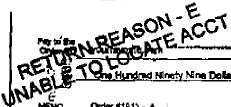
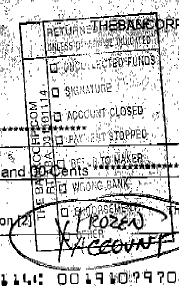
Stale Dated – Expired Check – Stale Check – Checks returned with a Stale Dated stamp are past the expiration date as set by the check issuer. Some checks are valid only if cashed or deposited within 7 days, 30 days, 90 days or 180 days. Checks with this time limit will be returned for Stale Dated or Expired Check and cannot be redeposited.
Post Dated – Post Dated Check – If a check is returned for Post Dated this means the date on the check was for a future date. Future dated checks can be returned for Post Dated or Post Dated Check. Checks that are returned and stamped Post Dated can be redeposited on or after, but not before the date in the date blank at the top right of the check. Also check by the endorsement for wording such as “check not valid until.”
Endorsement Missing – Endorsement – If a check or check draft is returned due to endorsement missing, this is because the depositor, not the account holder that issued the check, did not endorse the item. An endorsement is a signature or stamp that goes on the back of the check. At minimum, banks require a single signature in the endorsement blank on the reverse of the check. Other endorsements include, “For Deposit Only”, and “Without Recourse”, and “Pay to the order of” if making a third part endorsement. You can redeposit a check with Endorsement Missing stamped on it by adding an endorsement and redepositing the item.
Endorsement Irregular – Irregular Endorsement – Checks can be returned for irregular endorsement when there is a problem with the endorsement such as a signature mis-match, account number problem or if the endorsement cannot be read. Checks can also be returned for irregular endorsement if the endorsement goes below the like that says, “Do not endorse or write below this line.”
Signature (s) Missing – Missing signature or signature missing returns are common where the signature on a check is not present. Some checks can be returned for signature missing when two signatures are required to write a check on a particular account and only one signature appears on the check. A check with signature missing cannot be redeposited until the signature is gathered.
Signature (s) Irregular – Irregular signature or signature irregular returns are caused by a signature that does not match the account holder, or if the signature appears damaged, altered or otherwise obscured. Signature Irregular checks cannot be redeposited. A new item must be obtained from the maker of the check.
Non Cash Item – NCI – A check returned stamped Non Cash Item, Not Cash Item, NCI or Not for Cash is usually an invalid check, like a rebate coupon, promotional check, or gift certificate that is deposited in error as a real check. Items stamped NCI, Not Cash Item or Non Cash Item cannot be redeposited.
Altered Item / Fictitious Item or Counterfeit – A check returned stamped Altered, or stamped Fictitious item does not match the account holder’s records or the bank’s records as far as the amount, date or terms of the check and is being returned in dispute of its validity. This can be something as simple as someone writing a check for $125.99 and then changing the 5 in 125 to a 6 to make the check $126.50. Any alteration can void the check. A cross-out, alteration or change should be initialed by the account holder, but does not always stop returns, especially with high dollar items. This stamp, Altered Item, or Fictitious item can also come with forged money orders, forged cashier’s checks, and forged traveler’s checks.
Item Exceeded Dollar Limit – Checks are returned with this stamp, Item Exceeded Dollar Limit when an account holder has a cap on the maximum daily amount the account can pass in a day, or if there is a maximum check value for the account. Checks returned with this stamp cannot be redeposited.
Not Authorized – Unauthorized, Not Authorized, and UA stamps are typically a result of the account holder disputing the item during the payment presentment process, or if a particular block is noted on the account such as “no drafts” or “no debits” and such an item is presented. Items marked Not Authorized or Unauthorized cannot be redeposited.

What next:
If you have a check or draft returned, pay close attention to the reason code so you know if you can redeposit the item, or if you need to get a new payment from your customer.
– Reasons For Return Main Page
– Not Sufficient Funds
– Uncollected Funds Hold
– Stop Payment
– Closed Account
– Unable to Locate Account
– Frozen Account
– Refer to Maker
– Not Authorized
